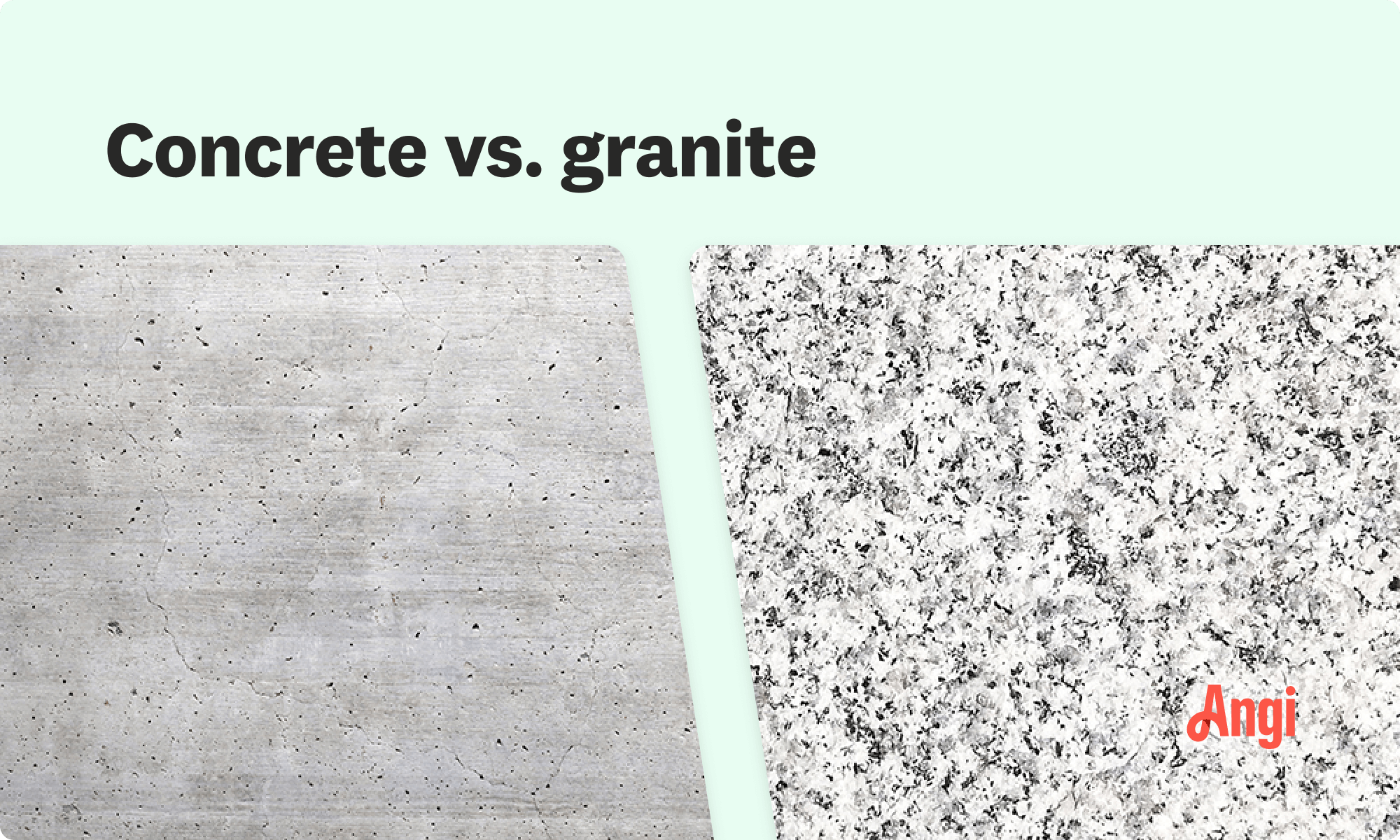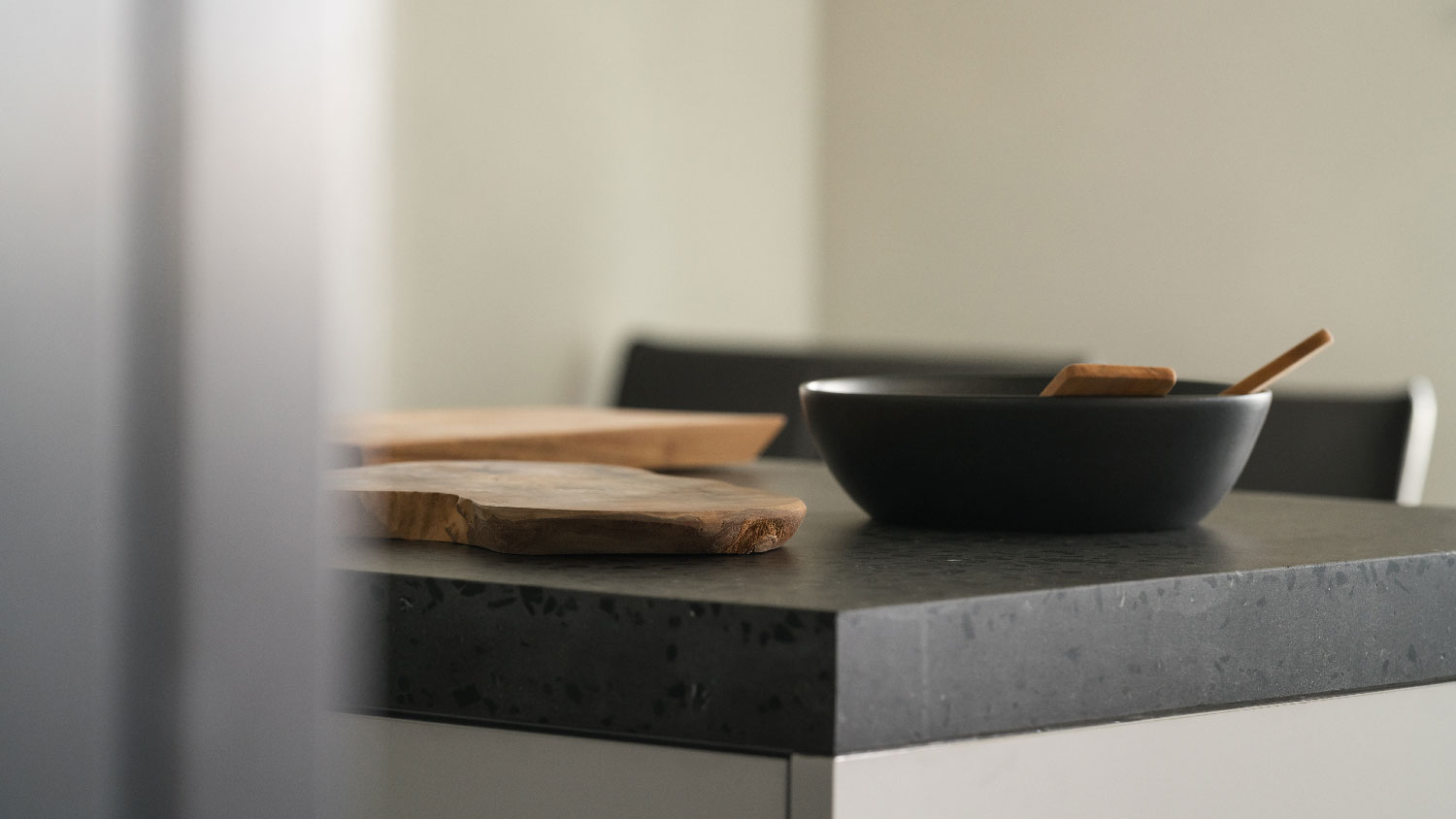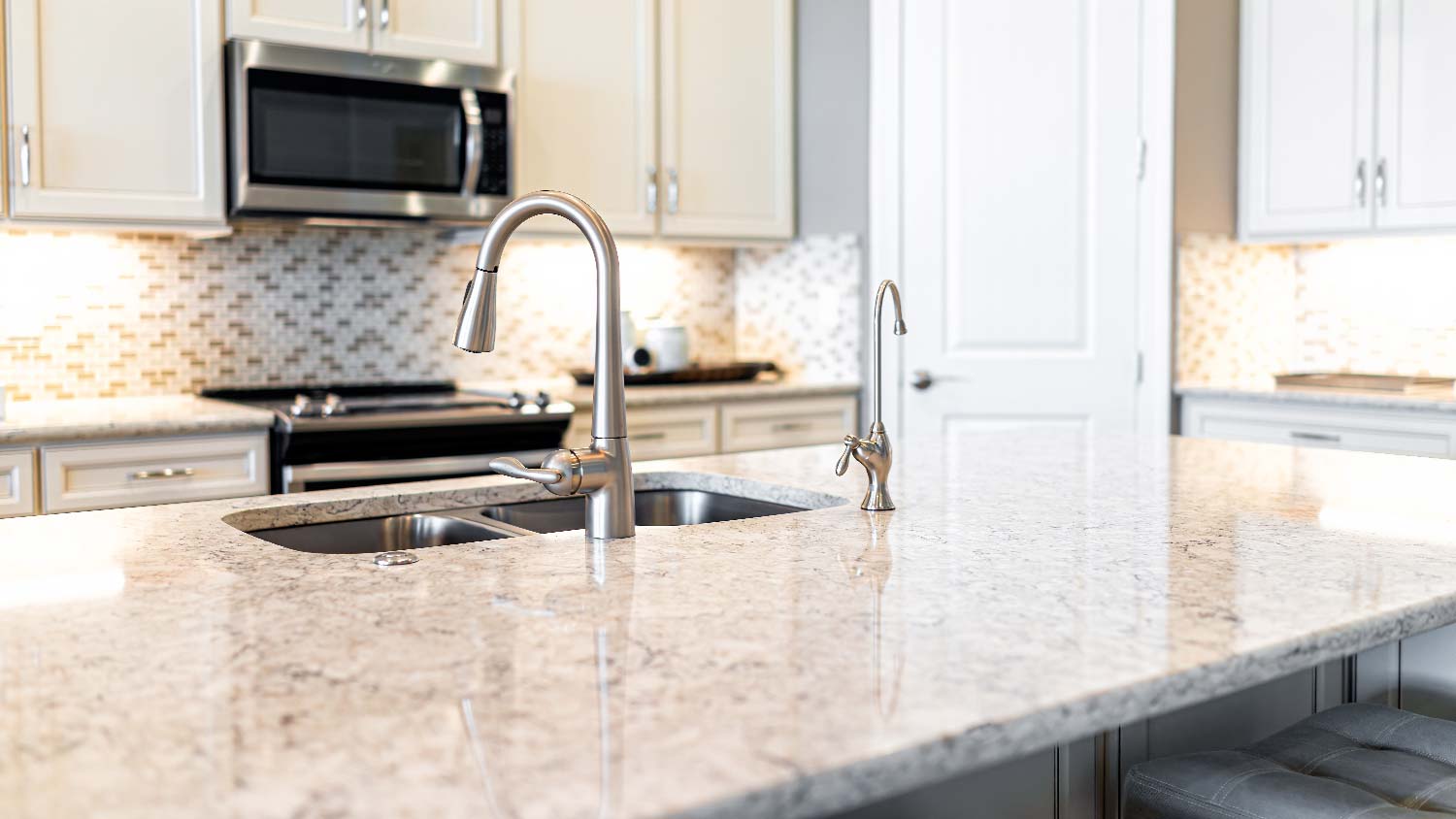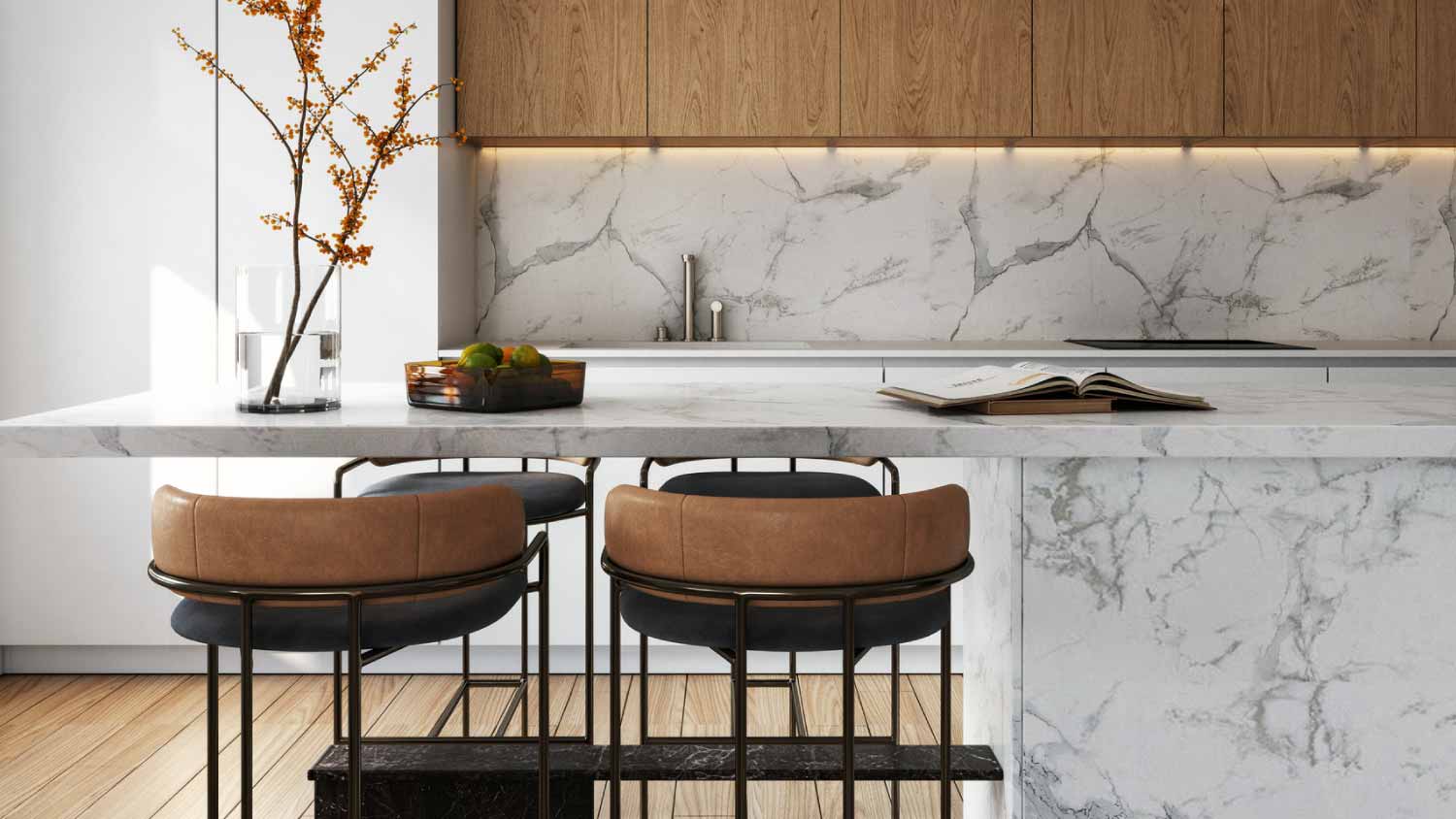
Kitchen islands are multipurpose workhorses in your kitchen. When looking to add one to your home, you should consider its size, materials, and its primary use in your home. Learn about the price of kitchen islands and their different features.
Choosing the right kitchen countertop can make or break your kitchen


Granite countertops are more luxurious looking but less customizable.
Concrete countertops cost more than granite countertops.
Concrete countertops are more prone to cracks.
Granite and concrete countertops require annual sealing.
Whether you’re remodeling your kitchen or building a new house, knowing how to choose countertops for your kitchen is important. Comparing concrete and granite countertops can help you understand these top-end countertop options and how they fit into your budget and lifestyle. The following guide breaks down all of the differing factors, including durability and customization.
Granite and concrete countertops are similar because they both last a lifetime and may increase your home's resale value. Granite is a natural stone that requires less maintenance and offers a one-of-a-kind look.
In contrast, concrete requires monthly waxing and annual sealing and can have a customized appearance from your choice of paint, stain, or integral dye.
Concrete countertops provide incredible durability and function in a kitchen. They are beautiful yet easy to maintain and can last a lifetime with proper care. They are an environmentally friendly choice for your kitchen, providing endless design possibilities.
Homeowners can add customizations to concrete, such as mosaic or embedded tiles, and can stain this material before or after installation. There are many concrete countertop pros and cons to consider.
| Pros | Cons |
|---|---|
| Long-lasting | High cost |
| Many customization options | Requires frequent sealing |
| Heat and scratch resistant | Can be prone to cracks |
Best for:
Homes with a lot of kitchen activity
Homeowners looking for low-maintenance countertops
Homeowners looking to add value to their home
Long lasting: With proper maintenance and use, concrete countertops can last a lifetime. Most homeowners invest in concrete countertops once and don't have to replace them while in the home.
Customization options: Concrete countertops don't have to be boring; you can use integral dye to dye them before installation or spray stain, paint, or acid wash to alter their color once installed. You can also include small trinkets within the concrete before it sets.
Heat and scratch resistant: Concrete countertops can withstand normal use and resist basic scratches and heat. However, you should always use a layer of protection, including a cutting board or hot pad between the counter and your items.
High cost: If you’re looking for kitchen countertops on a budget, the concrete countertop cost might knock it off your list. They cost between $65 and $135 per square foot, along the lines of marble and quartz countertop prices.
Frequent sealing: Concrete itself isn't food-safe, so concrete countertops require a food-grade sealant, such as tung oil, to make them food-safe. You must reapply the sealant every year or every two to three years, depending on how much use it gets.
Prone to cracks: Concrete naturally expands and contracts depending on the temperature, affecting the countertop's integrity. Improper installation and excessive water can also cause hairline cracks in concrete countertops.

Granite countertops are a natural material that is heat and scratch resistant. Because they are natural (not man-made), no two granite countertops will look identical. Granite countertops don't have anything added to them; they are cut as stone slabs and custom fit to your kitchen's specifications.
| Pros | Cons |
|---|---|
| Extremely durable | Porous material |
| No two countertops are the same | May have seams |
| Good resale value | Fissures may decrease its attractiveness |
Best for:
Homeowners who want to increase their home value
Anyone looking for a unique or natural look in their kitchen
Busy families who prefer scratch and heat resistant countertops
Durability: Because they are natural, these stone countertops will likely outlive you or your time in the home. They can last as long as 100 years as they are scratch and heat resistant, withstanding normal wear and tear.
Uniqueness: Granite countertops are all natural. There aren’t any particles added to them, so you get whatever nature provides, imperfections and all. This means no two granite slabs will look identical, which is important to some homeowners.
Resale value: Many homebuyers focus on the kitchen, and granite countertops can be a great selling point even if you don't update the rest of the kitchen. How much of a return you will get depends on many factors, including your location, but 10% to 20% is common.
Porous material: Granite is extremely porous, which means it can stain if not properly maintained. If it's not sealed properly, liquids can seep through the empty pockets in the granite and permanently stain it.
Seams: If you need more countertops than a single slab allows, you may have visible seams on your granite countertops. They are typically no larger than 1/16 inch, and installers fill them with a matching epoxy, so it's not obvious, but some may consider it a downside.
Potential fissures: Because granite is natural, there is the risk of fissures or what looks like small cracks throughout the granite. However, fissures don't pose a risk like actual cracks. They are just slight imperfections in the stone.
Choosing between concrete and granite countertops is a big decision! However, it goes beyond aesthetics. You should also consider durability, installation requirements, and repair needs. Check out the detailed comparison below to see how they stack up.

Granite has the lure of luxury. Its deep hues and polished look give it a more sophisticated look than concrete countertops, and some homeowners prefer the natural look. However, granite countertops are not customizable like concrete countertops.
So, if you're looking for something you can customize or change, concrete may be a better option because you can paint, stain, or dye concrete countertops. There are many concrete countertop ideas you can use.

You get what you get with granite countertops. You cannot customize them as they are 100% natural. While this can be a beautiful way to decorate your kitchen, some people prefer more control.
Concrete countertops are 100% customizable. You can have them dyed integrally before pouring or stain, paint, or acid wash them. This provides opportunities to create a custom look and match other elements in your kitchen or bathroom design. You can also have small pieces added to concrete for a more textured appearance, such as colored glass or shells.
Granite has a reputation for durability. While it's a porous material, annual sealing resolves that problem and stops spills from staining the countertop.
Concrete is also porous and requires annual sealing, but it also requires monthly waxing. It’s also more prone to cracks, which can require countertop replacement if they are severe. Improper installation or not using wire mesh or rebar to reinforce concrete countertops can make them weaker.

Granite countertops, despite their luxury, are typically less expensive than concrete countertops unless you choose highly luxurious options. On average, granite countertops cost $40 to $60 per square foot, and concrete costs $65 to $135 per square foot.
However, professional installation costs for both types are about the same at $30 to $90 per hour for concrete and $35 to $85 per hour for granite. It’s best to find a reputable countertop installer near you to ensure proper installation.
Installing granite and concrete countertops is best left to professionals, especially because both are very heavy. Granite countertops are cut to fit your kitchen and any special areas, like sinks, cabinets, and any built-ins. Concrete countertops can be cast directly in the kitchen or at a manufacturer's facility to your kitchen's specifications.
Both require professional expertise to ensure a proper fit and installation and to get the full durability and life expectancy from the countertops.
Repairing granite and concrete countertops is possible, and the faster you do it, the longer your counters will last.
Granite countertops are easy to repair and can be a quick DIY project, not requiring the help of professionals for minor damage. To fix chips, simply clean the granite counter and fill it with matching epoxy or acrylic. Pay attention to the areas immediately surrounding the chip, looking for discoloration that may require filling.
To repair concrete, you must get to the root of the problem: aka bare concrete. This may require extensive sanding and applying an epoxy to fill the crack. You must also determine what caused the crack, whether it’s natural issues, such as temperature changes or a weak structure.
Concrete and granite countertops can last a lifetime with proper care. The key is sealing both countertops annually and keeping up with repairs. The downside with concrete countertops is the color may begin to fade, especially due to excessive sunlight or normal wear and tear, and they may require more frequent staining to keep them aesthetically appealing.
Countertop installation costs an average of $1,850 to $4,450, with the material and size influencing costs the most. When choosing between concrete and granite countertops, expect to pay $1,500 to $6,000 for concrete and $2,000 to $4,000 for granite.
It’s almost always best to hire a pro to install countertops, especially with concrete or granite. Labor costs for installing either of these materials are around $30 to $95 per square foot, so you could save a lot by DIYing the installation—unless you make a mistake, which is likely.
Concrete countertop installation requires specialized skills and equipment, and mistakes could cause your countertop to crack. Similarly, granite slabs weigh hundreds of pounds and require proper sealing, grouting, and leveling. Repairing installation mistakes costs more than hiring a professional to install your countertops.
From average costs to expert advice, get all the answers you need to get your job done.

Kitchen islands are multipurpose workhorses in your kitchen. When looking to add one to your home, you should consider its size, materials, and its primary use in your home. Learn about the price of kitchen islands and their different features.

Butcher block countertops are a popular and durable choice for active kitchens. Learn how much it costs to install butcher block counters and what factors may affect pricing.

Are you leaning towards solid surface countertops? If so, you've likely come across Corian®. Find out how much Corian® countertops cost so you can plan your project.

Learn about the pros and cons of Dekton countertops to decide if this highly durable material is best for your indoor or outdoor kitchen.

In the battle of laminate versus quartz countertops, there isn’t always a clear winner. It depends on the project. Let’s get into the details before you buy.

If your countertops are getting old, dull, or showing signs of wear, it may be time to do something. But to refinish vs. replace countertops is the question.